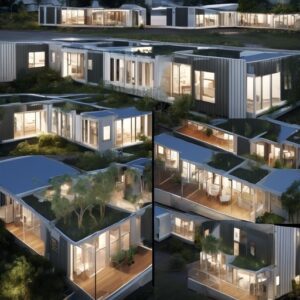In recent years, the automotive industry has witnessed remarkable transformations, with advancements in technology, changing consumer preferences, and environmental concerns reshaping the landscape. Amidst these changes, one aspect that often goes overlooked is the infrastructure of car dealerships. Traditional dealership construction methods are often time-consuming, costly, and inflexible. However, there is a solution on the rise: modular building.
Modular construction involves assembling pre-fabricated modules off-site and then transporting them to the desired location for final assembly. This innovative approach has gained traction across various industries due to its efficiency, sustainability, and versatility. In this article, we delve into why car dealerships should consider modular building as a game-changer in their operations.
Efficiency and Speed
Traditional construction methods for car dealerships can be notoriously slow, leading to delays in opening new locations or expanding existing ones. Modular building offers a significantly faster alternative. Since modules are constructed off-site simultaneously with site preparation, the overall construction timeline is drastically reduced. Car dealerships can be up and running in a fraction of the time it takes with conventional construction methods, allowing them to capitalize on market opportunities swiftly.
Cost Savings
Cost-effectiveness is a crucial factor for any business, and modular building excels in this aspect. The controlled environment of modular construction facilities minimizes material waste and labor inefficiencies, leading to cost savings. Additionally, the shortened construction timeline reduces financing costs and enables earlier revenue generation for dealerships. Moreover, modular construction’s predictability and reduced likelihood of unexpected expenses make it an attractive option for budget-conscious dealerships.
Flexibility and Customization
One of the most significant advantages of modular building is its flexibility in design and customization. Car dealerships can tailor the layout, size, and features of their modular buildings to meet their specific needs and preferences. Whether it’s accommodating a diverse inventory, integrating technology-driven showrooms, or incorporating eco-friendly features, modular construction offers ample opportunities for customization. This flexibility ensures that dealerships can create spaces that enhance customer experiences and align with their brand identity.
Sustainability
As sustainability becomes increasingly important in consumer decision-making, car dealerships are under pressure to adopt environmentally friendly practices. Modular building aligns well with sustainability goals due to several reasons. Firstly, the controlled manufacturing process minimizes material waste and optimizes resource usage. Secondly, modular construction allows for the incorporation of energy-efficient technologies and sustainable materials, reducing the environmental footprint of dealerships. Lastly, the potential for modular buildings to be disassembled, relocated, or repurposed enhances their lifecycle sustainability compared to traditional structures.
Adaptability to Market Dynamics
The automotive industry is dynamic, with evolving trends, market fluctuations, and changing consumer behaviors. Modular building offers car dealerships the agility to adapt to these market dynamics effectively. Whether it’s responding to shifts in demand, entering new markets, or adjusting dealership layouts, modular construction enables quick reconfiguration and scalability. Dealerships can expand, downsize, or reorganize their facilities with minimal disruption, ensuring they remain competitive and responsive to market changes.
Quality and Consistency
There’s a misconception that modular construction compromises quality in favor of speed and cost savings. However, modern modular building techniques prioritize quality and consistency without sacrificing efficiency. Factory-controlled manufacturing processes adhere to rigorous quality standards, resulting in buildings that meet or exceed traditional construction quality benchmarks. Moreover, the uniformity of modular components ensures consistency across multiple dealership locations, reinforcing brand image and customer trust.
Enhanced Customer Experience
Car dealerships are not just places to buy vehicles but also hubs for customer engagement and interaction. Modular building can enhance the overall customer experience by providing dealerships with modern, aesthetically pleasing spaces. From sleek showrooms to comfortable waiting areas, modular construction allows dealerships to create inviting environments that resonate with customers. Additionally, the flexibility of modular buildings facilitates the integration of digital technologies and interactive features, further enriching the customer journey.
Conclusion
In conclusion, modular building presents a compelling opportunity for car dealerships to revolutionize their infrastructure and operations. By embracing this innovative construction approach, dealerships can benefit from enhanced efficiency, cost savings, flexibility, sustainability, and adaptability to market dynamics. Moreover, modular construction enables dealerships to maintain high-quality standards, customize their facilities, and elevate the overall customer experience. As the automotive industry continues to evolve, modular building stands out as a strategic investment for dealerships looking to stay ahead of the curve and thrive in a competitive market landscape. It’s time for car dealerships to embrace the future of construction and unlock the full potential of modular building.


